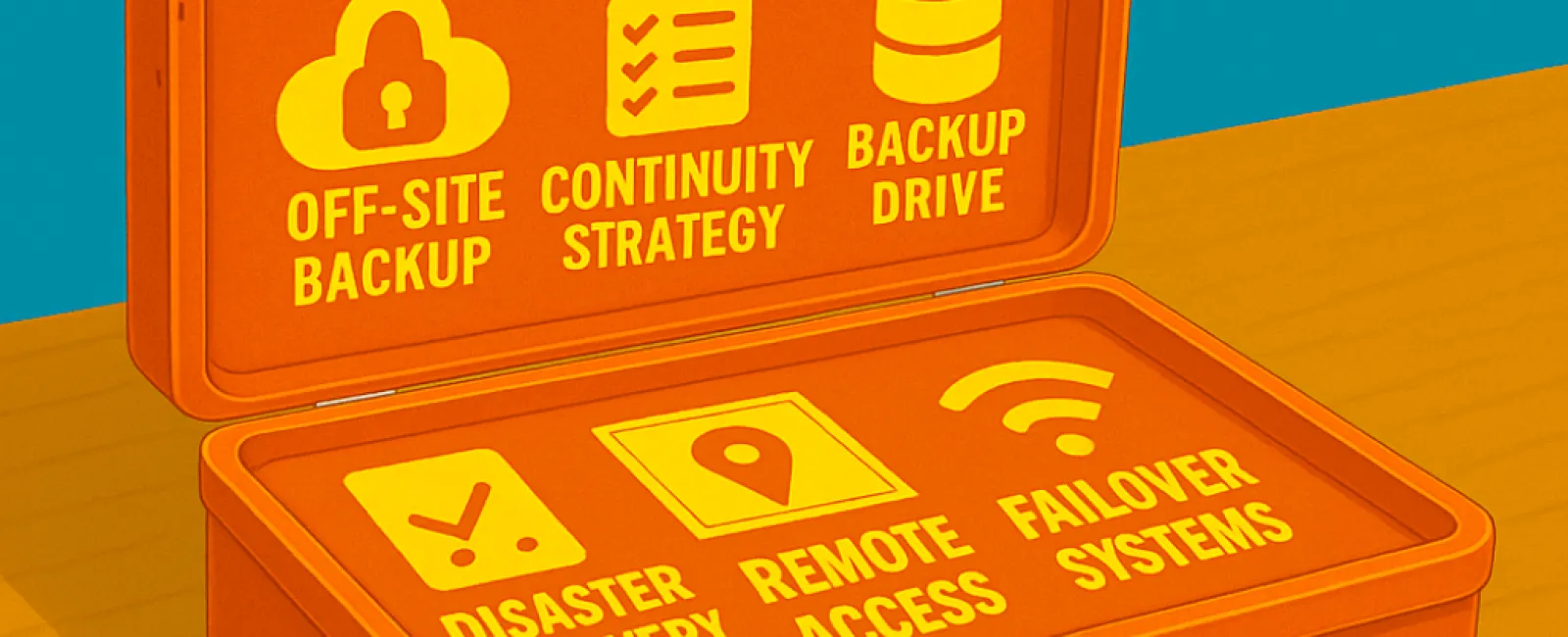July 28, 2025
Backups Aren't Enough—Your Business Needs Continuity
Power outages, cyberattacks, hardware failures, and natural disasters rarely give a heads-up. And when they strike, the consequences for small businesses can be devastating.
Many business owners think a simple backup is enough to stay safe. But here's the hard truth: restoring a file isn't the same as staying operational. If your systems are down, your team can't work remotely, and your clients can't reach you—then even a minor disruption can spiral into a major business setback.
A dependable IT partner should prepare you for those moments—not just with backups, but with a complete continuity plan that keeps your business running, no matter what.
Why Continuity Planning Matters
Let's be clear: backups are essential—but they're only one piece of the puzzle.
What you really need is a business continuity strategy—a proactive, tested plan that ensures operations continue smoothly during and after a crisis.
Because when your systems crash, files go dark, or your office becomes inaccessible, a backup file on a local server won't do much. Without a fast, coordinated recovery plan, you risk serious losses in revenue, reputation, and regulatory compliance.
Backups vs. Business Continuity: What's the Difference?
This is where many businesses get caught off guard:
-
Backups help you recover data.
-
Continuity helps you stay in business—even during the disaster.
A strong business continuity plan answers questions like:
-
How quickly can we recover and be fully operational?
-
Where can employees work if the office is compromised?
-
Which systems are mission-critical?
-
Who is responsible for executing the recovery plan?
And it should include:
-
✅ Encrypted, off-site, and immutable backups
-
✅ Defined RTO (Recovery Time Objective) and RPO (Recovery Point Objective)
-
✅ Remote work capabilities
-
✅ Redundant systems and failover options
-
✅ Regularly scheduled disaster simulations and testing
If your IT provider can't clearly walk you through these items, you're not prepared—you've just been lucky so far.
Is This Really Likely to Happen?
Yes. And it already has—for thousands of small businesses.
-
Hurricanes in Florida forced companies offline for weeks—those without cloud access were paralyzed.
-
Flooding in North Carolina wiped out on-site servers and months of billing data.
-
California wildfires leveled entire office buildings with no off-site recovery in place.
-
Countless ransomware attacks exposed corrupted or never-tested backups—leaving businesses with zero recovery options.
Disasters don't just target large enterprises—they hit businesses like yours every day.
Ask These Questions Before It's Too Late
If disaster strikes tomorrow, will your business keep going—or come to a halt?
Ask your IT provider:
-
If ransomware hits, how fast can we recover?
-
Are our backups tested regularly, and which systems are included?
-
What's the plan if a fire or flood wipes out our office?
-
Are we meeting all compliance requirements in our continuity plan?
-
Can we keep serving clients if the entire team has to work remotely?
If you're not 100% confident in those answers, your business is at risk—and you might not even know it.
Disasters Happen. Downtime Doesn't Have To.
You can't stop every storm, outage, or cyberattack—but you can control how your business responds.
A good IT provider helps you recover.
A great one makes sure you never miss a beat.
Want to know where your business stands?
Click here or call us at 866 766 1313 x 5005 to book your FREE Assessments
Let's make sure the next disaster is just a headline—not a business-ending event.

